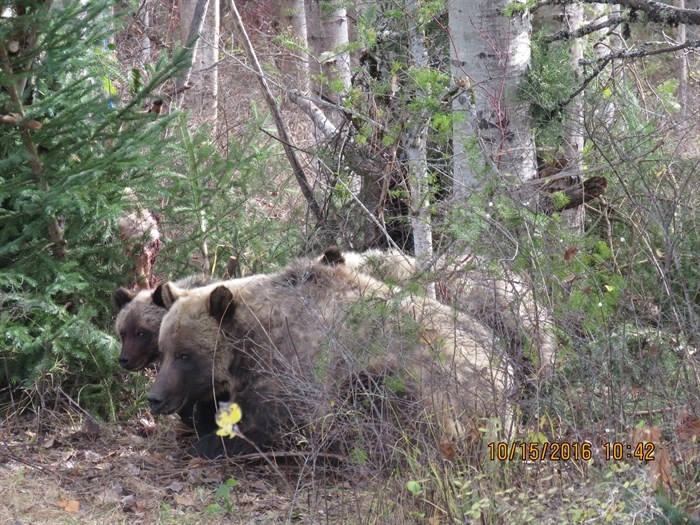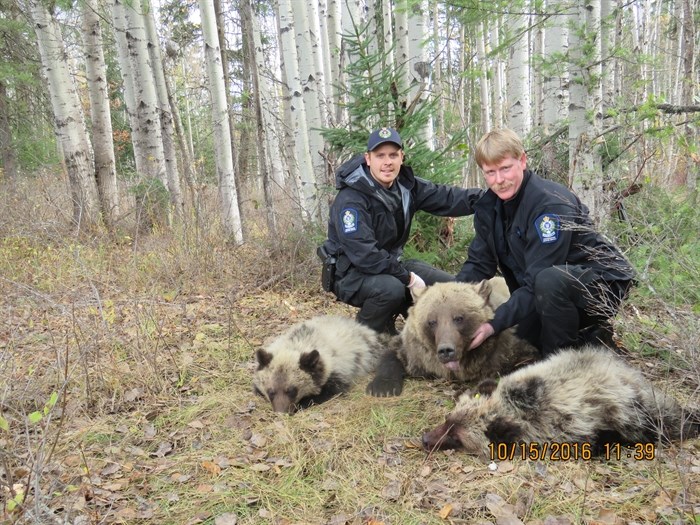
Conservation Officers captured and relocated three grizzlies from the Cherryville area on Oct. 22, 2016.
Image Credit: Contributed/B.C. Conservation Officer Service
October 24, 2016 - 6:30 PM
VERNON - Over the weekend, conservation officers tranquilized and relocated three grizzly bears — a mature grizzly sow and her two 10-month-old cubs — from the Cherryville area to their home range in the Monashee mountains.
According to North Okanagan conservation officer Ken Owens, before this happened, several steps were taken by officers to educate the public to deter the bears and prevent them from staying in the area.
Unfortunately for the bears, their habits were too habituated and too engrained for the preventative measures to make a difference. Owens says the bears were drawn to natural and non-natural attractants and started becoming habituated to feeding in that area, something that can put the public at risk.
"Sightings of these particular bears began last spring. For the most part, they were staying wild, but in the last month sightings became more frequent. They stopped fearing people and began to get into garbage, fruit trees, crab apple trees and started killing chickens," Owens says.
The chicken coop the bears attacked wasn't protected by an electric fence. Owens says that preventative measures could have stopped that from happening.
"More and more people are raising backyard chickens without thinking of how appealing they are to wildlife," Owens says.

Conservation officers say translocation is often a last resort when bears become too habituated to humans and human food sources.
Image Credit: Contributed/B.C. Conservation Officer Service
He says electric fences have been a successful tool to protect livestock, chickens, bees, fruit trees, gardens, buildings and campsites from bears. They prevent bears from becoming habituated to humans and conditioned to human food."
Once the bears were habituated the risk of conflict was too great and they had to go. The B.C. Conservation Officer Service worked with the Wildlife Branch at the Ministry of Natural Resource Operationson a plan to capture and remove the bears.
Officers captured, tranquillized, ear-tagged and relocated the animals to the far end of their home range in the Monashee Mountains on Oct. 22.
Even though these bears were transported, the high stress of translocating could take a toll.
"The capturing and translocation of this family unit of grizzly bears is not a success in terms of conservation, but rather a serious failure to control and restrict access to attractants," Owens says. "Translocation will cost far more then taking proactive steps to prevent the creation of problem bears and will not stop the problem in the medium to long term. Bears that are translocated are exposed to large amounts of stress and generally suffer high mortality rates ones transferred."
Part of relocating bears involves the officers scaring them as much as possible upon release. The goal is to get the bear to remember the human encounter as totally unrewarding.
"It's called adverse conditioning. Basically, they get pain stimuli like rubber bullets, screamer sound makers. We do not harm them, but we do scare them. We need them to associate being around humans with a bad experience so they will not return," he says.

Pictured above is the grizzly sow and her two cubs after Conservation Officers captured and tranquillized them in order to translocate the animals.
Image Credit: Contributed/B.C. Conservation Officer Service
Owens stressed that relocation is always the last resort and often it doesn't work in the long run. He says bears can be relocated to places 600 miles from where they were caught and still try to return to where they were feeding. They associate such a high reward with that area and often will return there or die trying.
According to the B.C. Wildlife Act, leaving an attractant accessible to dangerous wildlife can cost you. Fines start at $230 per incident. Owens says dangerous wildlife protection orders can be issued when attractants are not dealt with by homeowners. The Conservation Officers give them timelines to correct the actions and not complying with that can result in a $500 ticket. Every day of non-compliance costs even more.
The best way to report wildlife or attractants is to call the 'Report All Poachers and Polluters (RAPP)' hotline toll free at 1-877-952-7277, or online here.
In an attempt to avoid situations like this in the future, Conservation Officers and wildlife biologists are organizing an electric fence workshop in Cherryville, hosted by Gillian Sanders, Kaslo WildSafeBC coordinator.
To contact a reporter for this story, email Kim Anderson or email the editor. You can also submit photos, videos or news tips to the newsroom and be entered to win a monthly prize draw.
We welcome your comments and opinions on our stories but play nice. We won't censor or delete comments unless they contain off-topic statements or links, unnecessary vulgarity, false facts, spam or obviously fake profiles. If you have any concerns about what you see in comments, email the editor in the link above.
News from © iNFOnews, 2016